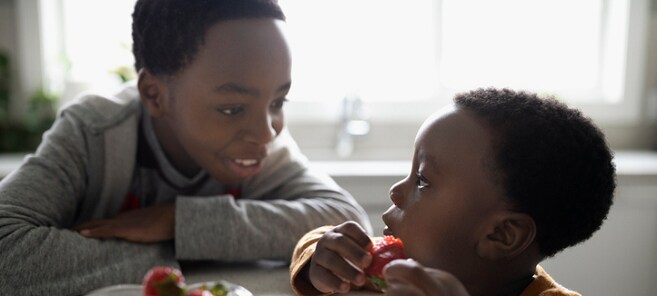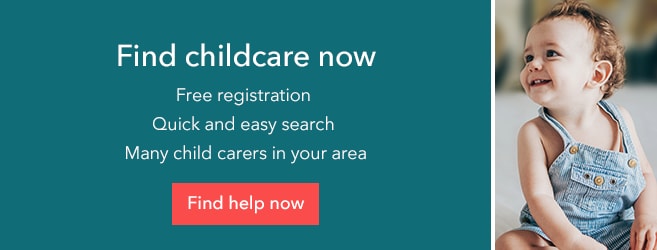Every parent looks forward to their baby’s first words. Language development is one of the biggest milestones there is for a child. However, due to this, the speech milestone is naturally surrounded by a lot of uncertainty and worry. On one day, each little goo-goo is a sure sign that your child is a genius; on others, you’re worrying that they’re being left behind and that something is wrong.
Looking for a babysitter? Find ones in your area now.
To help put your minds at rest, here we have listed the top speech milestones to look out for by age group:
Infants: Birth to 2 years old
Your baby will be vocal from the moment they are born. They will cry, grunt, and coo. After about four months, they will have picked up certain rhythms and inflections from hearing you speak, and will begin babbling nonsensically. Therefore it is important for you to chat to them as much as possible, allowing them to hear the way language flows.
At around 6 or 7 months old, they begin to repeat certain sounds over and over again (“ba-ba-ba-ba-ba”) and become more responsive to your words. Look for them to babble groups of sounds by 8 months.
By their first birthday, your baby may even have a real word or two. If they’re not pointing to objects that you name or they have no words between 12 and 15 months, it may be time to consult a certified speech-language pathologist. However, it is important to remember that there is a wide range of normal development for infants of around this age: one 18-month may be able to say nine words while another can say 50. Both are to be expected. If you’re still wondering if your toddler’s language development is normal, at 18 months you should notice that your child is talking more than using gestures.
Reinforce the language development that’s already going on by playing imitation games that use gestures and words, such as peekaboo or pat-a-cake.
Toddlers: 2 and 3 years old
A 2 year old will be able to understand a lot of what you say. They are likely to have around 50 words in their spoken vocabulary, and are beginning to say two-word sentences.
As they near their third birthday, you will notice that they are building longer sentences with a greater variety of words. Not only will they be naming objects, but they will have a basic understanding of verbs, pronouns, prepositions and adjectives. With over a hundred words in their vocabulary, they will be able to hold short conversations with you and other familiar adults.
A child at this age (the terrible twos) will also demonstrate phrases of defiance and independence. This behavior, while sometimes frustrating, means that they have reached an important language development milestone: using pronouns and plurals. This is why you’ll feel bombarded with “my” and “I” statements such as “my toys,” “I like,” “I want my ball” and so on. Though their demands may seem never ending, they’re learning to incorporate some basic rules of grammar into their speech.
At three years old, your little one should be chatting away, asking endless questions and using four or so sentences at a time to talk about what’s going on in their world. Their vocabulary will be expanding rapidly every week depending on how much language they are exposed to. Parents should therefore try to talk to their children as much as possible, encouraging them to talk back. For children living in a multilingual environment, this expansion will naturally be a bit slower: after all, they may distribute their knowledge of, say, 300 words between multiple languages.
Lucky for you, they will even be speaking clearly enough for strangers to understand, meaning they will be able introduce themselves to new friends and unfamiliar adults. They will be able to say rhyming words!
Preschoolers: 4 and 5 years old
Between four and five years old, children should be able to keep a conversation going, creating short sentences of about 5 words and up to two verbs. They will be able to retell longer stories in basic language. They will also begin to use basic past and future tense correctly. Additionally, your children will be able to demonstrate new skills such as understanding words for sequences (first, last and next), and following two-step instructions (“turn off the TV, and go brush your teeth”). They may also say different things depending on the listener and place.
Despite knowing many words, not everything that your four-year-old says will be pronounced correctly. Children between four and five may say sounds like S, Z, SH, CH and J incorrectly by protruding their tongue between their teeth, making a TH sound. They may also pronounce L like W or Y, R like a W, or TH like F or D. Don’t worry if this is the case for your little one — it’s common and should disappear completely by the time they are six. Nevertheless, your child’s speech should be able to be understood by unfamiliar listeners, and they should be able to communicate and play with other children.
By the time your child is ready to start school, their language skills are much more complex, and they’re beginning to read on their own. Your little chatterbox will have come a long way from the cooing baby you held in your arms, but it’s a wonderful journey to take together.
While language development milestones provide some guidance for what to expect, they aren’t set in stone. Try a few at-home activities to get your child talking. For instance, play dumb: when they make requests, try to get more information by acting confused or taking a while to respond. To get them to request action, give them toys or objects they cannot open, so they have to ask for help.
Take a look at our article on Language Games to Support Speech Development for more ideas about what you can do to help your child along with their developing language. Also, check out Care.com’s range of local tutors for additional support with your child’s language development.
Read Next: When Can Kids Walk to School Alone?
Read Next: Encouraging Your Children to Read Books
Read Next: Tips for Raising Happy Children

